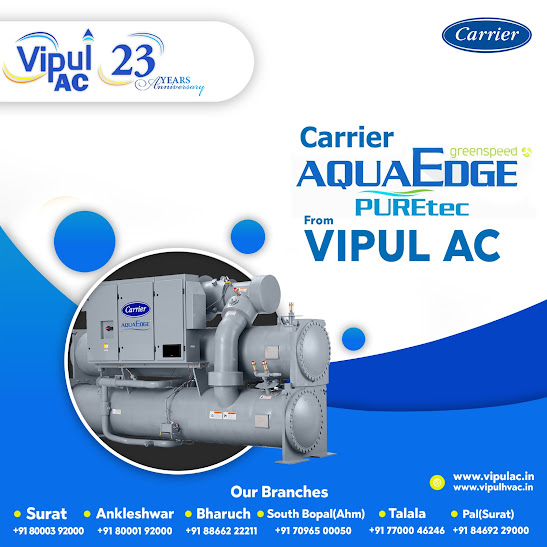An industrial chiller is a specialized cooling system used in various industrial applications to remove heat and maintain controlled temperatures. It is designed to handle large cooling loads and is commonly used in manufacturing plants, industrial processes, data centers, hospitals, and other facilities where precise temperature control is essential. Here are some key aspects of industrial chillers:
Cooling Capacity: Industrial chillers are designed to provide substantial cooling capacity to meet the high heat loads generated by industrial processes. They are capable of cooling large volumes of air, water, or other process fluids efficiently.
Types of Chillers: There are different types of industrial chillers, including air-cooled chillers and water-cooled chillers.
Air-cooled chillers: These chillers use ambient air to remove heat from the refrigerant, typically through an air-cooled condenser. They are self-contained units and do not require a separate cooling tower or water source.
Water-cooled chillers: These chillers use water as a cooling medium and rely on a separate cooling tower or a water source to dissipate heat. Water-cooled chillers are often more efficient and suitable for larger cooling applications.
Compressor Technology: Industrial chillers utilize various compressor technologies, such as reciprocating compressors, scroll compressors, screw compressors, or centrifugal compressors. The choice of compressor depends on factors like cooling capacity, efficiency, and specific application requirements.
Cooling Medium: Industrial chillers can cool different mediums, including air, water, or process fluids, depending on the specific industrial process or application.
Energy Efficiency: Energy efficiency is an important consideration for industrial chillers. Many modern chillers incorporate features like variable speed drives, energy-efficient compressors, heat recovery systems, and advanced control algorithms to optimize energy usage and reduce operating costs.
Controls and Monitoring: Industrial chillers often come with advanced control systems that allow precise temperature regulation and monitoring. These control systems may include programmable logic controllers (PLCs), human-machine interfaces (HMIs), and connectivity options for remote monitoring and control.
Service and Maintenance: Proper maintenance and regular servicing are essential for ensuring the optimal performance and longevity of industrial chillers. It is important to follow manufacturer recommendations and schedule routine maintenance to keep the chiller in optimal working condition.
Industrial chillers are highly customizable based on specific cooling requirements, load demands, and industry standards. Consulting with an HVAC specialist or contacting industrial chiller manufacturers can provide further guidance in selecting the most suitable chiller for your industrial cooling needs.
More Info Regarding Chiller Enquiry Visit : https://vipulac.in or call +91 8000392000

Comments
Post a Comment